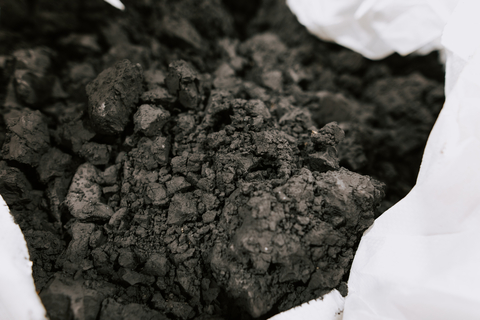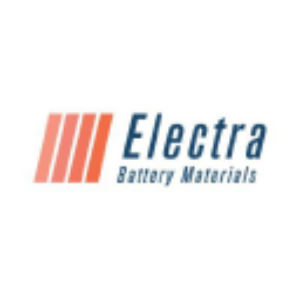Electra Extends Processing of Black Mass Material Based on Successes of Its Battery Recycling Trial
- Improved recoveries of high-value elements and higher metal content in saleable products
- Reduced use of reagents
- None.

Black mass material ready for processing at Electra's refinery. (Photo: Business Wire)
“Results from of our plant-scale black mass trial continue to exceed our expectations,” said Trent Mell, Electra’s CEO. “Recovery rates for nickel, cobalt, and manganese continue to improve along with enhancements to our hydrometallurgical process and reductions in reagent consumption. As we accelerate our black mass recycling strategy, our focus has broadened to include upstream battery scrap shredding as well as upgrading our refined products to a battery-grade quality. While we anticipate releasing a summary report of our findings from the demonstration plant we have been operating for the past nine months, we have decided to extend our demonstration plant operations to build on recent success.”
Black Mass Recycling Trial Highlights
-
Electra has processed 40 tonnes of black mass material to date in a plant scale setting, believed to be the first of its kind in
North America . - Recovery rates for all targeted metals have improved since the start of the trial in late December 2022.
-
Recovery rates for manganese, in particular, have improved by more than
50% from results achieved in a lab setting. -
Metal content contained in the nickel-cobalt mixed hydroxide precipitate (MHP) produced from the recycling process has increased in the range of 5 to
10% since the start of the trial. An increase in metal content results in a higher value saleable product, thereby improving the potential economics of continuous recycling operations. - Approximately 20 tonnes of nickel-cobalt MHP product has been shipped to customers to date.
- Reagent requirements have been reduced and in some cases alternative, less costly reagents have been used for improved overall metal recovery. Further, some of the reagent additions substituted have reduced overall impurity levels within the process. The reduction in reagent use and substitution of certain reagents are expected to lower operating expenses, thereby improving the economics of continuous recycling operations.
- Based on results achieved to date, Electra has elected to continue processing black mass material at its refinery complex, to further enhance its process and continue delivery of saleable products to customers.
- Electra anticipates providing a detailed summary report of its key findings from its black mass trial in the coming weeks.
“As the only plant-scale operator in
Electra launched its black mass trial at the end of December 2022, and has processed material in a batch mode, successfully extracting products containing lithium, nickel, cobalt, manganese, copper, and graphite. Electra’s trial is being conducted at the Company’s refinery complex north of
Black mass is the industry term used to describe the material remaining once expired lithium-ion batteries are shredded and all casings removed. Black mass contains high-value elements, including lithium, nickel, cobalt, manganese, copper, and graphite, that once recovered, can be recycled to produce new lithium-ion batteries.
Established North American battery recyclers have focused on collecting and shredding of batteries with the resulting black mass material primarily treated by a pyrometallurgical smelting process that has a higher carbon footprint and lower metal recoveries than hydrometallurgical processes.
Recycling black mass will increasingly become a key feature of the EV battery supply chain given the strong demand for critical minerals and the looming supply deficit of metals such as nickel and cobalt. According to data from McKinsey & Company, available battery material for recycling is expected to grow by
About Electra Battery Materials
Electra is a processor of low-carbon, ethically-sourced battery materials. Currently constructing North America’s only cobalt sulfate refinery, Electra is executing a multipronged strategy focused on onshoring the electric vehicle supply chain. Keys to its strategy are integrating black mass recycling and nickel sulfate production at Electra’s refinery located north of
Neither the TSX Venture Exchange nor its Regulation Services Provider (as that term is defined in policies of the TSX Venture Exchange) accepts responsibility for the adequacy or accuracy of this release.
Cautionary Note Regarding Forward-Looking Statements
This news release may contain forward-looking statements and forward-looking information (together, “forward-looking statements”) within the meaning of applicable securities laws and the United States Private Securities Litigation Reform Act of 1995. All statements, other than statements of historical facts, are forward-looking statements. Generally, forward-looking statements can be identified by the use of terminology such as “plans”, “expects”, “estimates”, “intends”, “anticipates”, “believes” or variations of such words, or statements that certain actions, events or results “may”, “could”, “would”, “might”, “occur” or “be achieved.” Forward-looking statements are based on certain assumptions, and involve risks, uncertainties and other factors that could cause actual results, performance, and opportunities to differ materially from those implied by such forward-looking statements. Among the bases for assumptions with respect to the potential for additional government funding are discussions and indications of support from government actors based on certain milestones being achieved. Factors that could cause actual results to differ materially from these forward-looking statements are set forth in the management discussion and analysis and other disclosures of risk factors for Electra Battery Materials Corporation, filed on SEDAR at www.sedarplus.ca and with the
View source version on businesswire.com: https://www.businesswire.com/news/home/20231002051460/en/
Joe Racanelli
Vice President, Investor Relations
info@ElectraBMC.com
1.416.900.3891
Source: Electra Battery Materials Corporation







